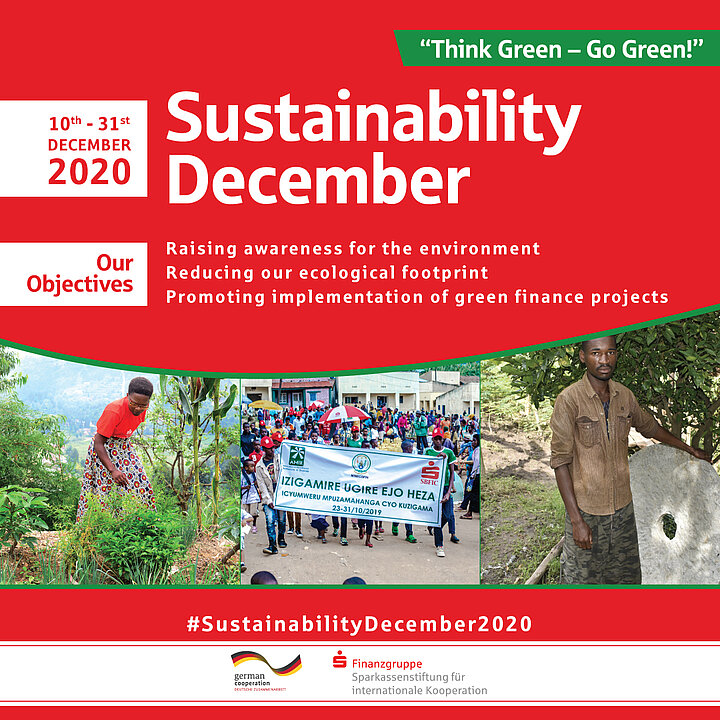The rapid climate change, natural resource depletion, and pollution have put environmental issues high on the global agenda. These issues have called for targeted initiatives by economic agents to promote a green economy through the development of climate-friendly projects and support climate mitigation and adaptation efforts. In line with this, players within the financial landscape have shifted focus towards sustainable finance, which entails addressing environmental, social and governance (ESG) issues and using financial instruments to promote and support projects with sustainable economic impact.
For Microfinance Institutions (MFIs), the concept of green finance is evidenced by green microfinance, which encompasses all microfinance activities that consider the impact of climate change. While microfinance institutions' contribution towards Sustainable Development has majorly been through their financial and social objective, green microfinance goes a notch higher by introducing a third objective related to environmental Sustainability.
MFIs’ need to revitalize their role in promoting sustainable development through robust green microfinancing case is based on two fronts. First, studies have shown that poor households, who constitute most Microfinance clients, heavily rely on natural ecosystems as they do not have strategies to mitigate their vulnerability to climate. Therefore, they suffer the most from climate change effects. If no action is taken to address climate change, microfinance clients will struggle to pay their loans. Consequently, their default rates will increase, resulting in liquidity problems for the MFIs they borrowed from. Secondly, micro-entrepreneurs and small traders also participate in activities that are relatively polluting the environment because they lack adequate finances to make their businesses 'sustainable'. As such, the burden of finances has forced them to adapt to hazardous production ways. In Kenya, for instance, small industries such as those of mining, sand harvesting, charcoal business, among others, are some of the sectors that relatively contribute to environmental degradation are dominated by microentrepreneurs and small traders. Furthermore, micro-entrepreneurs are exposed to significant environmental risks and expose their local environment and communities.
Effective microfinancing calls upon MFIs to adopt climate mitigation as well as adaptation efforts. To this end, German Sparkassenstiftung Eastern Africa (DSIK), under their #SustainabilityDecember2020 campaign, encourages the Microfinance landscape in Eastern Africa, which includes Deposit-Taking Microfinance (DTMs) institutions, Microfinance Banks, Credit only MFIs and SACCOs to continue embracing 'green microfinancing' for their clients and members. Specific emphasis is on:
- Microfinance institutions to develop a diverse portfolio of 'green' products to finance their clients' green dynamic activities. Most of the financing has focused on agribusiness. However, there are other green solutions, such as in ecological projects (e.g., installing renewable energy equipment, water recycling and waste management etc.) that contribute to alleviating climate change effects and improving livelihoods. In Burundi, DSIK collaborated with GIZ, and the Belgian Red Cross implemented the AKASUGA project. The project's overall goal was to improve access to microcredit for savings groups to build AKASUGA latrines. The ecological toilet serves as a source for organic manure, which increases farm yield.
- As an organization, microfinance providers should also commit themselves to reduce their internally ecological footprint. Tools to establish their operations ecological impact can be adopted, which will inform measures to be undertaken to mitigate the effects. Areas for quick wins that can be considered include efficient managing of waste disposal, adopting a sustainable transport matrix for employees, going paperless, among other initiatives.
- Provide non-financial services to its customers, such as training programs on environmentally friendly practices and awareness campaigns on the environment.
- To make green microfinancing a business success, MFIs should consider partnerships with local companies that offer green solutions. Such partnerships can inform financing models for MFIs clients to acquire the solutions.
- MFIs should lobby with their apex organizations to develop guidelines on 'green financing' to streamline industry action plans on sustainable finance. For example, an apex organization for commercial banks in Kenya, Kenya Bankers Association (KBA), launched the Sustainable Finance Initiative (SFI) Guiding Principles. The principles aim to raise awareness of sustainable practices and ESG risks within the banking sector in Kenya.
German Sparkassenstiftung Eastern Africa is dedicated to assisting MFIs in delivering sustainable development through green microfinancing. Such assist will come in the form of supporting MFIs in developing green finance products. Support the implementation of green products through financial literacy games and finally offering technical and business advisory.

